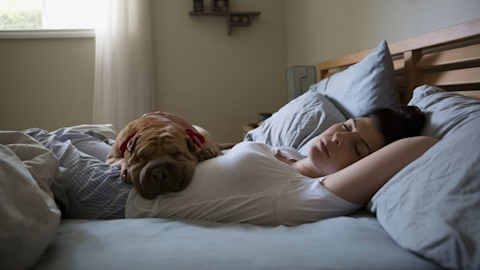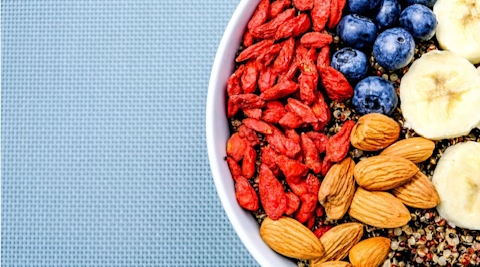Coffee, alcohol and sleep: How your morning and nighttime habits are causing problems at bedtime
Are you daily habits impacting your sleep more than you think?

A morning coffee on our commute and a quick wine after hours with colleagues aren’t uncommon bookends to a busy workday.
But, relying too much on caffeine in the day to keep us motivated and productive, coupled with a few drinks to wind down after work, can impact our ability to sleep and how productive we are the next day.
Worse still, they can have detrimental effects on our physical and mental health.
“Relying on wine and coffee to get us through the day or night is not ideal,” explains nib foundation partner, Hello Sunday Morning, opens in a new tab.
What does coffee do to our bodies?
The reason 75% of Australians, opens in a new tab are drinking at least one cup of coffee a day might be partly because of the effect caffeine has on our bodies.
Caffeine stimulates our brain and nervous system, increases our breathing and heart rate, and can boost mental alertness and physical energy.
With long work hours and an always-on office culture, almost 40% of us aren’t getting enough sleep, opens in a new tab, meaning a caffeinated pick-me-up in the morning is a welcome boost.
Health experts suggest that up to 400mg a day , opens in a new tabis an acceptable amount of caffeine. That’s somewhere between two and four small espresso-based coffees, such as a cappuccino. Any more than that and we risk side effects such as anxiety, restlessness, headaches and impaired sleep.
More serious impacts can include a rise in body temperature, frequent urination, dehydration, dizziness, a faster heartbeat, nausea, irritability and trembling hands.
The effects of alcohol on our health
While we know that drinking excessively is bad for our health, opens in a new tab, Australian work culture still often revolves around long lunches, team catch-ups at the pub or after work drinks with clients.
“Excessive alcohol consumption can seriously impact our wellbeing and increase our risk of many health complications,” warns Hello Sunday Morning. “Some of these include mental health challenges, an increased risk of diabetes, increased blood pressure, fertility issues, an increased risk of some cancers and cirrhosis of the liver.”
Alcohol can also impact how much sleep, opens in a new tab we’re getting and the quality of our sleep. Drinking in the evening increases our need to wake in the night due to dehydration or more frequent urination, leading to broken sleep and missed sleep cycles. This can result in feeling sluggish and tired the next day which can affect energy levels and productivity at work.
How to create healthier habits with caffeine and alcohol
To ensure your coffee habit doesn’t impact your sleep cycle, experts recommend avoiding any caffeinated drinks, opens in a new tab (coffee, coke, energy drinks, etc) or food (chocolate) up to eight hours before bedtime.
And while no amount of alcohol is good for you, Australian health guidelines suggest drinking no more than four standard drinks in one sitting and no more than 10 standard drinks in a week. Read more about what constitutes a standard drink., opens in a new tab
If you are finding it hard to reduce your caffeine and alcohol intake, look at changing your usual routine.
Swap out the morning team meeting over coffees in the boardroom with a walking meeting outside.
Ditch after work drinks at the pub for a mocktail social event in the office.
Encourage your teams to start a social sports teams or lunch time, opens in a new tab yoga to extend the wellness offering at work and put a spotlight on physical and mental wellbeing.
Ensure there are non-alcoholic drinks, opens in a new tab freely available at work events and model healthy behaviours to employees and colleagues by not drinking at work functions. Managers and employers have a duty of care to ensure people don’t feel pressured to drink if they don’t want to.
Old habits can be hard to break, but a healthy working culture can encourage all employers and employees to think about and support their own health.
If you need help reducing alcohol you can talk to your GP who can offer advice, plus put you in touch with local support services.
If you’d like to improve your relationship with alcohol you can also take the Hello Sunday Morning Alcohol and Wellbeing Self-assessment , opens in a new tabwhich will provide personalised feedback about your drinking, health and wellbeing.
The information contained in this article is provided as general information only and is not intended to be a substitute for professional medical advice, diagnosis, or treatment. For personalised medical advice, always consult your qualified healthcare professional.

12 tips for getting a better night’s sleep
Expert tips to improve sleep quality, boost energy and manage work stress for better rest.

What are the best foods to eat for concentration?
Need help focusing? These foods may help

Mindful management: How to support your team’s mental health
Mindful management is about having awareness of team needs, here we suggest effective ways you can support stressed out colleagues.